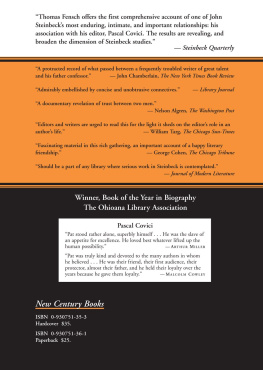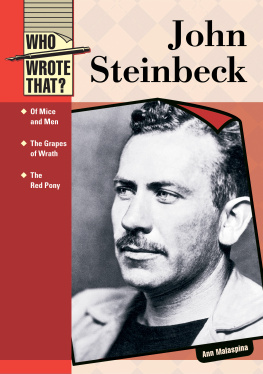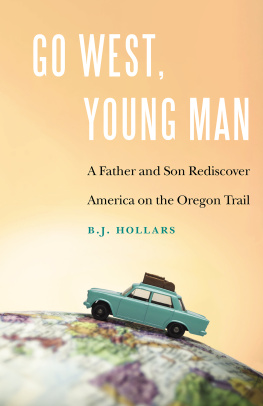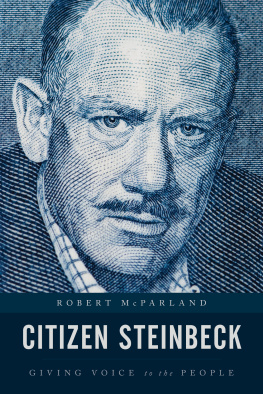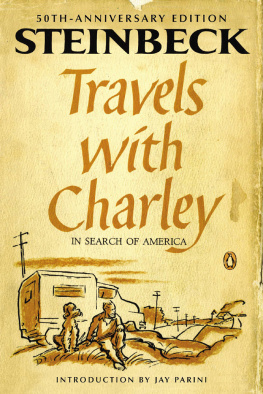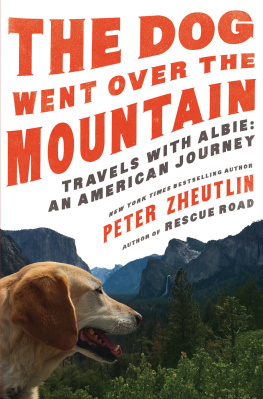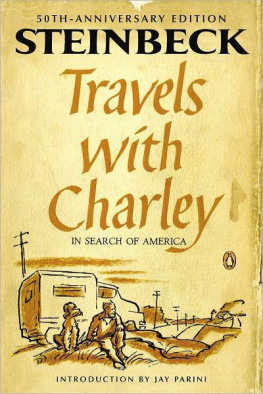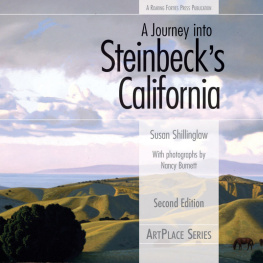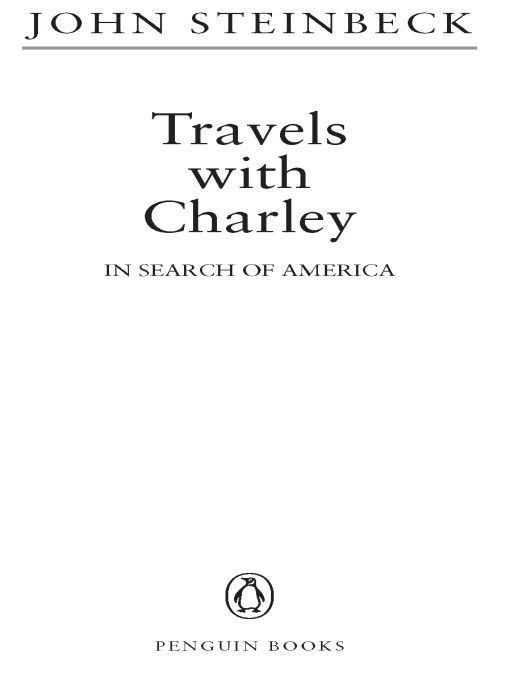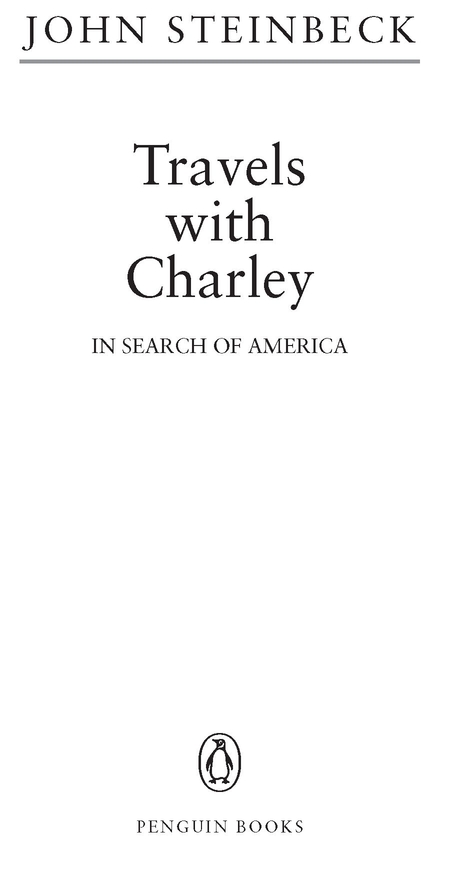Table of Contents
PENGUIN BOOKS TRAVELS WITH CHARLEY
Born in Salinas, California, in 1902, JOHN STEINBECK grew up in a fertile agricultural valley about twenty-five miles from the Pacific Coastand both valley and coast would serve as settings for some of his best fiction. In 1919 he went to Stanford University, where he intermittently enrolled in literature and writing courses until he left in 1925 without taking a degree. During the next five years he supported himself as a laborer and journalist in New York City and then as a caretaker for a Lake Tahoe estate, all the time working on his first novel, Cup of Gold (1929). After marriage and a move to Pacific Grove, he published two California fictions, The Pastures of Heaven (1932) and To a God Unknown (1933), and worked on short stories later collected in The Long Valley (1938). Popular success and financial security came only with Tortilla Flat (1935), stories about Montereys paisanos. A ceaseless experimenter throughout his career, Steinbeck changed courses regularly. Three powerful novels of the late 1930s focused on the California laboring class: In Dubious Battle (1936), Of Mice and Men (1937), and the book considered by many his finest, The Grapes of Wrath (1939). Early in the 1940s, Steinbeck became a filmmaker with The Forgotten Village (1941) and a serious student of marine biology with Sea of Cortez. He devoted his services to the war, writing Bombs Away (1942) and the controversial play-novelette The Moon Is Down (1942). Cannery Row (1945), The Wayward Bus (1947), The Pearl (1947), A Russian Journal (1948), another experimental drama, Burning Bright (1950), and The Log from the Sea of Cortez (1951) preceded publication of the monumental East of Eden (1952), an ambitious saga of the Salinas Valley and his own familys history. The last decades of his life were spent in New York City and Sag Harbor with his third wife, with whom he traveled widely. Later books include Sweet Thursday (1954), The Short Reign of Pippin IV: A Fabrication (1957), Once There Was a War (1958), The Winter of Our Discontent (1961), Travels with Charley in Search of America (1962), America and Americans (1966), and the posthumously published Journal of a Novel: The East of Eden Letters (1969), Viva Zapata! (1975), The Acts of King Arthur and His Noble Knights (1976), and Working Days: The Journals of The Grapes of Wrath (1989). He died in 1968, having won a Nobel Prize in 1962.
BY JOHN STEINBECK
FICTION
Cup of Gold
The Pastures of Heaven
To a God Unknown
Tortilla Flat
In Dubious Battle
Saint Katy the Virgin
Of Mice and Men
The Red Pony
The Long Valley
The Grapes of Wrath
The Moon Is Down
Cannery Row
The Wayward Bus
The Pearl
Burning Bright
East of Eden
Sweet Thursday
The Winter of Our Discontent
The Short Reign of Pippin IV
NONFICTION
Sea of Cortez: A Leisurely Journal of Travel and Research
(in collaboration with Edward F. Ricketts)
Bombs Away: The Story of a Bomber Team
A Russian Journal (with pictures by Robert Capa)
The Log from the Sea of Cortez
Once There Was a War
Travels with Charley in Search of America
America and Americans
Journal of a Novel: The East of Eden Letters
PLAYS
Of Mice and Men
The Moon Is Down
COLLECTIONS
The Portable Steinbeck
The Short Novels of John Steinbeck
Steinbeck: A Life in Letters
OTHER WORKS
The Forgotten Village (documentary)
Viva Zapata! (screenplay)
CRITICAL LIBRARY EDITION
The Grapes of Wrath (edited by Peter Lisca)
This book is dedicated to
HAROLD GUINZBURG
with respect born of an association and
affection that just growed.
JOHN STEINBECK
PART ONE
When I was very young and the urge to be someplace else was on me, I was assured by mature people that maturity would cure this itch. When years described me as mature, the remedy prescribed was middle age. In middle age I was assured that greater age would calm my fever and now that I am fifty-eight perhaps senility will do the job. Nothing has worked. Four hoarse blasts of a ships whistle still raise the hair on my neck and set my feet to tapping. The sound of a jet, an engine warming up, even the clopping of shod hooves on pavement brings on the ancient shudder, the dry mouth and vacant eye, the hot palms and the churn of stomach high up under the rib cage. In other words, I dont improve; in further words, once a bum always a bum. I fear the disease is incurable. I set this matter down not to instruct others but to inform myself.
When the virus of restlessness begins to take possession of a wayward man, and the road away from Here seems broad and straight and sweet, the victim must first find in himself a good and sufficient reason for going. This to the practical bum is not difficult. He has a built-in garden of reasons to choose from. Next he must plan his trip in time and space, choose a direction and a destination. And last he must implement the journey. How to go, what to take, how long to stay. This part of the process is invariable and immortal. I set it down only so that newcomers to bumdom, like teen-agers in new-hatched sin, will not think they invented it.
Once a journey is designed, equipped, and put in process, a new factor enters and takes over. A trip, a safari, an exploration, is an entity, different from all other journeys. It has personality, temperament, individuality, uniqueness. A journey is a person in itself; no two are alike. And all plans, safeguards, policing, and coercion are fruitless. We find after years of struggle that we do not take a trip; a trip takes us. Tour masters, schedules, reservations, brass-bound and inevitable, dash themselves to wreckage on the personality of the trip. Only when this is recognized can the blown-in-the-glass bum relax and go along with it. Only then do the frustrations fall away. In this a journey is like marriage. The certain way to be wrong is to think you control it. I feel better now, having said this, although only those who have experienced it will understand it.
My plan was clear, concise, and reasonable, I think. For many years I have traveled in many parts of the world. In America I live in New York, or dip into Chicago or San Francisco. But New York is no more America than Paris is France or London is England. Thus I discovered that I did not know my own country. I, an American writer, writing about America, was working from memory, and the memory is at best a faulty, warpy reservoir. I had not heard the speech of America, smelled the grass and trees and sewage, seen its hills and water, its color and quality of light. I knew the changes only from books and newspapers. But more than this, I had not felt the country for twenty-five years. In short, I was writing of something I did not know about, and it seems to me that in a so-called writer this is criminal. My memories were distorted by twenty-five intervening years.
Once I traveled about in an old bakery wagon, double-doored rattler with a mattress on its floor. I stopped where people stopped or gathered, I listened and looked and felt, and in the process had a picture of my country the accuracy of which was impaired only by my own shortcomings.



